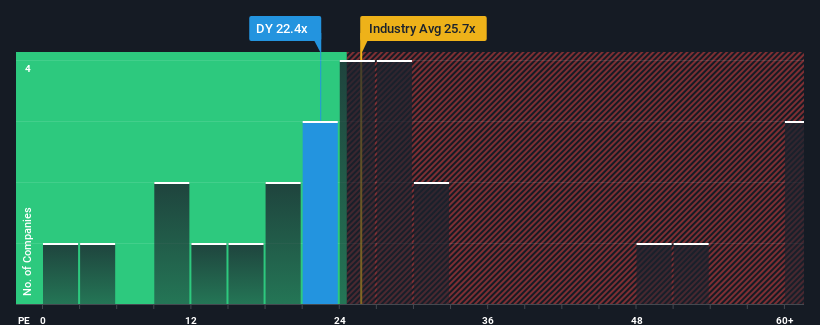- United States
- /
- Construction
- /
- NYSE:DY
Dycom Industries, Inc.'s (NYSE:DY) Shares Climb 26% But Its Business Is Yet to Catch Up

Despite an already strong run, Dycom Industries, Inc. (NYSE:DY) shares have been powering on, with a gain of 26% in the last thirty days. The last 30 days bring the annual gain to a very sharp 76%.
After such a large jump in price, Dycom Industries' price-to-earnings (or "P/E") ratio of 22.4x might make it look like a sell right now compared to the market in the United States, where around half of the companies have P/E ratios below 17x and even P/E's below 9x are quite common. Nonetheless, we'd need to dig a little deeper to determine if there is a rational basis for the elevated P/E.
Recent times have been pleasing for Dycom Industries as its earnings have risen in spite of the market's earnings going into reverse. The P/E is probably high because investors think the company will continue to navigate the broader market headwinds better than most. If not, then existing shareholders might be a little nervous about the viability of the share price.
Check out our latest analysis for Dycom Industries

What Are Growth Metrics Telling Us About The High P/E?
In order to justify its P/E ratio, Dycom Industries would need to produce impressive growth in excess of the market.
If we review the last year of earnings growth, the company posted a terrific increase of 34%. Pleasingly, EPS has also lifted 267% in aggregate from three years ago, thanks to the last 12 months of growth. Accordingly, shareholders would have probably welcomed those medium-term rates of earnings growth.
Shifting to the future, estimates from the eight analysts covering the company suggest earnings should grow by 11% per year over the next three years. That's shaping up to be similar to the 10.0% per year growth forecast for the broader market.
With this information, we find it interesting that Dycom Industries is trading at a high P/E compared to the market. Apparently many investors in the company are more bullish than analysts indicate and aren't willing to let go of their stock right now. These shareholders may be setting themselves up for disappointment if the P/E falls to levels more in line with the growth outlook.
The Key Takeaway
Dycom Industries' P/E is getting right up there since its shares have risen strongly. Generally, our preference is to limit the use of the price-to-earnings ratio to establishing what the market thinks about the overall health of a company.
We've established that Dycom Industries currently trades on a higher than expected P/E since its forecast growth is only in line with the wider market. When we see an average earnings outlook with market-like growth, we suspect the share price is at risk of declining, sending the high P/E lower. This places shareholders' investments at risk and potential investors in danger of paying an unnecessary premium.
Before you settle on your opinion, we've discovered 1 warning sign for Dycom Industries that you should be aware of.
If P/E ratios interest you, you may wish to see this free collection of other companies with strong earnings growth and low P/E ratios.
New: Manage All Your Stock Portfolios in One Place
We've created the ultimate portfolio companion for stock investors, and it's free.
• Connect an unlimited number of Portfolios and see your total in one currency
• Be alerted to new Warning Signs or Risks via email or mobile
• Track the Fair Value of your stocks
Have feedback on this article? Concerned about the content? Get in touch with us directly. Alternatively, email editorial-team (at) simplywallst.com.
This article by Simply Wall St is general in nature. We provide commentary based on historical data and analyst forecasts only using an unbiased methodology and our articles are not intended to be financial advice. It does not constitute a recommendation to buy or sell any stock, and does not take account of your objectives, or your financial situation. We aim to bring you long-term focused analysis driven by fundamental data. Note that our analysis may not factor in the latest price-sensitive company announcements or qualitative material. Simply Wall St has no position in any stocks mentioned.
About NYSE:DY
Dycom Industries
Provides specialty contracting services to the telecommunications infrastructure and utility industries in the United States.
Very undervalued with excellent balance sheet.
Similar Companies
Market Insights
Community Narratives


